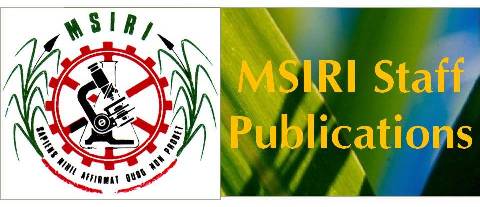Progress towards the generation of drought tolerant transgenic sugar cane containing the CBF4 transcriptional factor from Arabidopsis
| MSI06P4222 | |
| McQualter, R. Dookun-Saumtally, A. | |
| Progress towards the generation of drought tolerant transgenic sugar cane containing the CBF4 transcriptional factor from Arabidopsis | |
| Abstracts, 5th ISSCT Molecular Biology Workshop, 3-7 April 2006, Réduit, Mauritius | |
| 5th ISSCT Molecular Biology Workshop, Réduit, Mauritius, 3-7 April 2006 | |
| Conference paper | |
| 2006 | |
| p.4.6 | |
| Abstract only | |
| En | |
| En | |
| CBF4 is one of a group of transcriptional factors whose expression is induced by drought or cold and which in turn activate many cold/drought responsive genes containing C-repeat/dehydration-responsive elements in their promoter. Activation of this set of genes in turn allows many plants to increase their tolerance to drought and cold. We are currently attempting to improve drought tolerance in sugar cane by introducing the Arabidopsis CBF4 gene into sugar cane under the control of the maize Ubiquitin promoter and the nos terminator. Three known orthologues from maize are also being tested in like manner. Selection of a suitable Mauritian sugar cane cultivar with efficient transformation and regeneration characteristics has proven difficult, however a recent change to the Australian cultivar Q117 has yielded promising results. At this stage, embryogenic callus co-transformed with CBF4, and the marker genes nptII and GFP, are showing stable expression of GFP while undergoing regeneration in the light. Transgenic lines containing the CBF4 gene will be indentified by PCR. The CBF4 transformants will be multiplied in tissue culture and then tested for their response to various environmental stresses including drought, cold and salinity. To achieve this end, a number of assays from the published literature have been adapted to sugar cane. It has been determined that most of the initial testing can be done while the plants are still in tissue culture which will greatly reduce the time taken to identify the most likely drought-tolerant candidates. These candidates will then be assessed in glasshouse and field trials for drought tolerance. Real-time PCR will be employed to assess the impact that overexpression of the CBF4 transcriptional factor in sugar cane has on key downstream water-stress-responsive genes, including putative sugar cane orthologues of Cor47 and Kin1 as identified by tblastn searches of the NCBI sugar cane EST database. | |
| sugarcane genetic engineering CBF4 transcriptional factor Arabidopsis | |
| Mauritius | |
| cane breeding and genetics | |
| 2006-12-28 | |
| En | |
| Biotech | |
| Biotech |
